Serendip is an independent site partnering with faculty at multiple colleges and universities around the world. Happy exploring!
Brain, Education, and Inquiry - Fall, 2010: Session 6

Session 6
Class is itself an experiment in a particular form of education: co-constructive inquiry
Learning by interacting, sharing observations and understandings to create, individually and collectively, new understandings and new questions that motivate new observations
Depends on co-constructive dialogue, being comfortable sharing existing understandings, both conscious and unconscious, in order to use them to construct new ones. Need diversity of understandings, need to be able to both speak and listen without fear of judgment. Need to see both self and others as always in process, always evolving
Working through commenting on papers on line. Of interest so far ...
"To do well within the education system is to be institutionalized ..." ... D2B
we should be focusing less on standardized testing ... eledford
Society has acknowledged and progressed in many areas within special education, but ED [emotional disturbance] is still taboo ... epeck
If we fail to incorporate a more experiential style of learning into the current system, idea generation and creation of new knowledge will be stifled ... Angela DiGoia
"The idea is that, rather than learning words or word pieces out of context, students will begin and continue the process of learning to read by becoming experts on their favorite books" ... Abby Em
"Instead of leaving creativity development to chance, it should be nurtured in all the students from the very start. " ... Amenah
"rest allows one to be a more adept learner of new information, and that when a challenge is posed rest allows one to be better able to come up with creative and helpful solutions." ... FinnWing
"Teachers show students, from the very beginning of their educations, how to interact with other people, understand them, and be generous and receptive to difference. Teachers model ways of being in the world ..." ... Bennett
Will finish on-line comments, email additional comments within next week.
Modified course schedule to add two additional PG orchestrated sessions. Think of topics you want to organize, individually or in groups.
Continuing from where we are: from last weeks forum
We may have patterned activities, but that we are able to go outside of them is reassuring as it means that there is really creativity and surprise to be had ... FinnWing
the ability to adapt to different environments and to learn to solve new problems quickly and effectively is desirable not only for its own sake but also for the sake of employability. Usefulness and education for education's sake do not have to contradict ... LinKai_Jiang
so what happens in the case of Christopher Reeves, for example, to the neurons that are below where he severed his spinal cord? Is there no way for them to communicate with the neurons above, even if it's in a round-about way? ... Angela DiGioia
This article is so frustrating...I feel that my characteristics, moods, emotions, conscience, motivations, and what not are not competing with each other as separate entities; but complimenting each other in some way or another, and very connected, unable to be set apart or disconnected ... eledford
I feel like if we have so many "selves" then we would have no consistent personality and instead our actions would be all over the place ... ln0691
This article actually describes my experience of reality pretty well ... it seems right to say that we are each more a plurality than a central authority ... the "selves" are intimately connected, set up to help each other out, balance one another, or sometimes in a sort of self-sabotaging structure, but always in a more complicated relationship than just competing ... jessicarizzo
I see us as having situational roles/identities more so than selves, as selves don’t represent who we truly “are.” .... mmc
I think that my different simones are my own creation, as the stage, home, and classroom simone are conscious creations that i have established in order to try to be as successful as possible in diffrerent situations ... simonec
I very much like the idea of there being multiple selves and not having to choose one of them to be “me”. However, like other similar post-modernist ideas, it sounds great in theory but might not be applicable practically ... Assuming that some of these parts will be in conflict with each other, how do you live your life? How do make decisions? Maybe that’s why multiple personality is considered a disorder. This can also be generalized for multiple selves to multiple realities/worlds. How do we feel about that? Do we see some inherent truth in it but disregard it because in the world and society we’ve constructed, it just wouldn’t work? Moreover, what implications does that have for education? If we let go of the idea of there being one self, then what does education do? ... Amenah
entity theorists see their characteristics as more set and unalterable, factors out of their control. Incremental theorists, on the other hand, see themselves as able to change and improve due to their own efforts, see themselves as more malleable due to their own volition and behaviors ... Abby Em
Is education the medium by which we establish and develop our "selves"? ... L Cubed
Thinking of the essence of a person in terms of their nervous system is an idea I would like to pursue more ... epeck
|
Implications for education (to date):
- Stop presenting understandings as "right," "definitive"; present instead as foundation for developing new understandings?
- Diversity in classrooms an asset rather than a problem?
- Ability to see things in multiple ways a virtue, a desired result of education?
- Inquiry skill is present at birth, rather than dependent on maturation/education (How Babies Think)
- Acknowledge, make use of distributed/bipartite organization, internal "conflict"?
- ????
Adding to our model/story of the brain
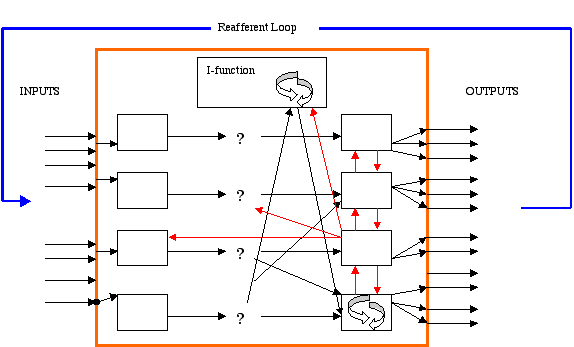
Notice loop, comparison of expectation and input, as per loopy science/inquiry
Notice also that "conflict" is a necessary element of empirical inquiry and of ns organization as empirical inquirer
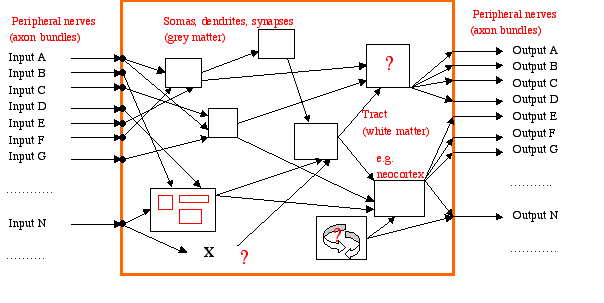
Topographic organization: the brain as a distributed system, interacting "separate entities" that can be "disconnected"
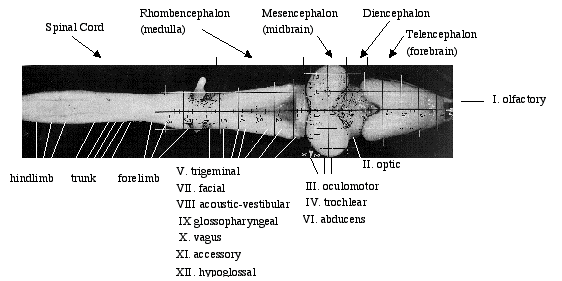
Beginnings of sensation/perception: pattern of action potentials in sensory neurons; action: patterns of action potentials in motoneuron; thinking: patterns of action potentials in interneurons
Brain as distributed system (simulation), no one in charge, coordination by interaction, dealing with difference productively
Using multiple perspectives ... to add location and depth (multiple depth cues)
| Binocular stereopsis resolving conflict |
But ... creating ambiguity |
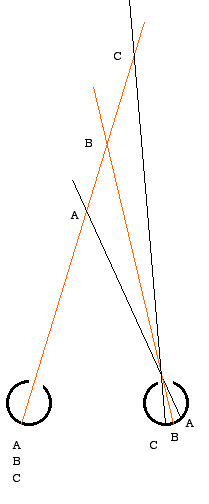 |
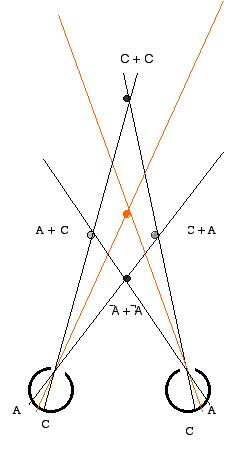 |
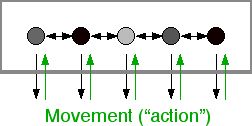
The bipartite brain - adding in the neocortex (where is Christopher Reeves?)
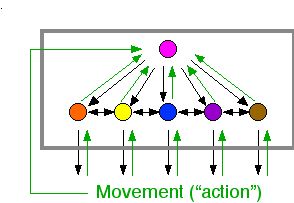

More on bipartite brain
Blindsight, cortical paralysis, dissociative fugue, skilled athletic performance
Dreaming, sleep walking, locked in syndrome
Relevant for thinking about constructedness of world but also of self: pain, phantom limb pain, confabulation
Interactions of cognitive unconscious (Marvin Minsky, Society of Mind) and story teller
Thoughts, feelings, aspirations not parallel to cognitive unconscious but rather derived from it
Emotion, intuition not distinct from thought but a part of it (Antonio Damasio, Descartes' Error)
Internal co-constructive dialogue/inquiry as well as external
Internal conflicts (weight control), added capabilities: to conceive beyond experience
Paul Bloom, First Personal Plural (see also It take all kinds to make a brain), and forum discussion at Dissociative identity disorder
Implications for understanding "understanding"? (look over for next class session)
Your continuing thoughts about distributed systems, bipartite brain in the forum below ....

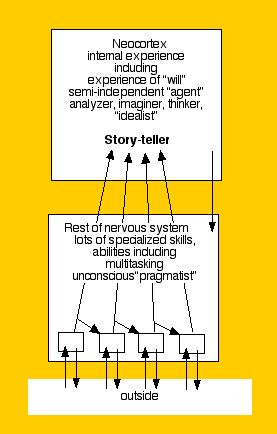


Comments
A lot of our discussion was
A lot of our discussion was about leaders, both within the classroom setting and otherwise (the geese, for example). Initially, I found it very hard to accept that there does not always need to be a leader for a system to work. When I was thinking about the example of the geese, even when the goose that appeared to be the leader was "killed", the structure still remained. However, another goose did take its place. It seemed as if that format of there being a leader and followers needed to be maintained. We were also told in class that internally, the geese are all the same so there is nothing in a particular goose that would make it a more likely leader. Why, then, would a goose take that front spot in the formation? Its not like the maintenance of the structure depends on there being a leader. Maybe it's just habit, that's the way the geese have always known things to be and that's why it persists? Moreover, maybe this can be applied to the classroom as well. Maybe learning does not come from being taught be a leader/teacher. But then what would be the basis of teaching and learning? Maybe (like the geese, again) an internal state of knowing how to learn, should instead be created and instilled in students from the start. The teacher, then, would not need to be the leader. If the student had the agency and the ability to be his or her own teacher, then each student would be their own leader. Maybe that is what education should aim to do.
Awareness
The argument is that the NS consists not of one fully distributed system but of everything we experience and are aware of. All we see is what we make up to account for what's being inputted.
Awareness - a choice? Can we choose the extent of how aware we are of something? Or are we always aware , or always in tune even when we think we're not?
Does awareness = input? If so, are we selective for inputs subconsciously or consciously? Or are we just selective of what our brain does with the input, or how it is processed and relayed?
Understanding
It is clear that it is hard to explain where our own understandings come from, to convince others to accept our understandings we have developed and as well to accept the understandings others have formulated. However, do individuals who utilize multiple sources of understanding (intuition, experimental and unconscious) more likely to accept and be flexible towards different people being able to come about different understandings of the same thing? Or is it possible that such a combination of understandings creates frustration and conflicts, much like those that occur already for people who don’t follow or accept the understandings that others have? Does leadership require all three types? Why is simple logic sometimes hard to grasp? (For example in the MHD experiment). Is it because of a cognitive overload or overthinking being done or is it just one of the common approaches taken for understanding which someone selects, some approaches being more adaptive than others in given situations? How much does awareness and intuition interact/conflict with each other?
Who's to Blame?
“The multiplicity of selves becomes more intuitive as the time span increases…we tend to attribute out own bad behavior to unfortunate circumstances, and the bad behavior of others to their nature.” The Atlantic, “First Person Plural”
How is it possible to have multiple “selves” within one brain (body)? At first, I thought that this was an excuse that people use when they’ve done something bad and don’t want to claim responsibility. Children will say that they were angry when they hurt another child the same way that a murderer will say that they were clinically insane when they committed murder and should not be held responsible. How is this possible to separate the many “personalities” that someone can have from their physical being as one person? It’s difficult to argue that there are multiple people within one body, but I could be persuaded to believe that any individual has different characteristics and decision-making selves that arise depending on the situation. However, it seems that this is a one-way street. An individual is able to say that they should be excused for their bad behavior because they were not themselves (whomever that is) whereas they would judge and critique someone else with whom they associate a negative experience, say getting reprimanded at work or at home as a child (even if it’s only one time), as a mean or bad person on the whole. Now, that doesn’t seem fair, does it? Where does moral judgment arise in the brain and how do we decide which of our “selves” wins in the end? Obviously there are people who exhibit both ends of the spectrum—incredibly moral and selfless versus purely self motivated and detrimental towards others—and they were presumably born with remarkably similar brain structures and function. So, where does the bad self arise and dominate the good self into submission?
Me too..
I have struggled with this idea too, especially when in last class we discussed that this is no master controller in our brain, but rather that organization occurs via intercommunication. Getting into the moral issues as you have described above would be of interest to me for the discussion. Is it societal based? What is right and wrong to the brain, trial and error within a culture and its views? What is controlling thoughts, actions, urges? How does interconnectedness fit in there?
Many philosophers, including
Many philosophers, including Kant and Hume, have expressed doubts about what we can know about the world through our experience. Kant and Hume both think that we cannot know the objects in the world as they are. What we can claim about the objects as such are either mediated by our cognition or illusions. The idea of the biparte brain provides the biological explanation of why we cannot know the world “directly”. Our most immediate contact with the world is processed through the brain stem, or the “frog brain”. The experiential data generated is sent to the cerebral cortex. It is in this upper region of the brain that we experience the world. Case studies of brain injuries give us the observation that theoretically we can see something without experience it. The brain stem can see some object, but without the help of the cortex we cannot experience what we see.
There is the general assumption that the cognitive work of our cerebral cortex is superior than other parts of the brain. When philosophers prize seeing the world directly, surely they can’t mean that it is more valuable to see the world with the “frog brain”. Given the physical impossibility to sense the world directly through our cerebral cortex “direct contact” of the world, if it were to be a distinctively human activity, somehow it has to be the task of the cerebral cortex. Then how can the cerebral cortex be in “direct contact” with the world? Some philosophers say that it cannot be done. Some philosophers like Hegel redefines our intellectual quest and say: we can’t know the world as it is, however a wealth of the world is available to us as mediated, through our consciousness. Perhaps this is where we can start most fruitfully.
parallax
I got excited last class when Paul demonstrated the ability of the brain to synthesize contradictory input by having us focus on on object with only one eye, then watch it shift when we used the other eye... it's a phenomenon/effect called parallax that gets taken up as an extended metaphor by Slavoj Žižek in his book, The Parallax View (which you should absolutely check out if you like your philosophy peppered with references to Tom Waits songs, Henry James novels, and movies like Alien... way more fun than Kant). Žižek is interested in reconciling different philosophical/critical theory projects that seemingly have nothing to do with one another, but one conclusion he comes to that I think is applicable here is that "truth" isn't in this or that philosopher's description of the way the world works. We have so many different, often contradictory, pictures of the universe's organization presented to us in philosophy, in artistic (re)presentations, and as we saw last class, in the basic sensory input our organism is receiving all the time. With so much diversity, how can we say a single picture is "complete" or accurate?
In Rachel Wilson's article about mouse olfactory bulbs, she's talking about the benefits of diversity among input-processing equipment on a biological level, but warns that results in vivo might be different from those demonstrated in vitro. I think if we take seriously what we've learned in this class about life outside of the test tube, we have to think that these pro-difference findings will be even more valuable applied to the "real" world. Because accurately summarizing the plot of a film isn't analogous to being able to summarize/master/represent in consciousness our actual life-world. It's too big, too complex, and also ever-shifting because it is itself a construction of the brain. Attempts to master or get the whole/correct picture will always prove futile. What we want now is agility. This is where Žižek says truth is, not in one philosophical system or the other, not in the image produced by the input coming from one eye or another, but in the movement between the two. So truth isn't a content thing at all... not even an inaccessible noumenal content thing. Truth isn't a representable image but that which cannot be contained in consciousness. Because it can't be contained. It's always moving. It's just that jump back and forth, or from one thing to the next. Parallax doesn't refer to the synthesized image but to the the effect of the displacement... which is something we actually can have "direct contact" with.
Thinking and Feeling
Our awareness essentially comes from our upper nervous (the neocortex), which is made up of many communicating parts that make a concerted effort to make sense of the world. The nervous system receives input and it is made sense of in the neocortex. The neocortex does not receive input (it does not have sensory neurons), except from the nervous system. This is the idea of the bipartite brain. I believe I have a basic understanding, but would appreciate corrections if not.
The above idea is very liberating. I was thinking about it today. If everything that we feel is from our neocortex, with help from the "frog brain," then we should be able to have a great deal of self-control. I feel that I can, to a great extent, "control" my thoughts (when I try very hard), and these thoughts are a part of the activity in the neocortex. The neocortex then works with the nervous system, which communicates with the extra-nervous system world via sensory and motors neurons, and if one controls the neocortex and the nervous systems actions, then emotions and feelings seem much more controllable. Of course this idea could use refining, but all day I have been feeling things on my body and rather than allowing any thoughts to develop based on these sensations, I have been just feeling how my body reacts. In this way maybe a part of the neocortex is shutting off valuations of the world and just feeling, thus allowing annoying thoughts and feeling to dissipate. Today was a cool experiment with this idea...Maybe someone has thoughts on this idea?
what is thought?
Why does having all "thought" in the neocortex suggest that we can control our thoughts? Maybe because our thoughts are sort of not directly responding to stimulus, but have space (in the interneurons?) to process whatever input or output our nervous system deals with?
Are our "thoughts" actually just interneurons?
There's that self-help adage saying that the only thing we have control of is how we react to a situation - we cannot control the input, but the output is within our grasp and we are able to change the way we think about and react to situations. Is this true? Are the interneurons within our control or does the nervous system (mind not included - because who knows what the mind is...) control our thoughts?
Lars - how did you stop yourself from generating thoughts about the input you were receiving? It seems like it would be extremely difficult to feel a sensation and not form a thought (is sensation thought anyway?)...
Thoughts on Thought
The idea is that conscious thought is in the neocortex, and input comes to the neocortex via interneurons, which feel the world via sensory neurons. If we try, it is possible to block thought for short periods of time and then we are left with only sensations. The idea that I was getting at, is trying to develop the ability to prolong the time between thoughts with the premise that thought arises from neuron interaction.
This idea is not very well developed and may have many flaws, but I think it does work because if we are able to stop conscious thought for a short time, then why is it not possible to do so for longer periods?
can we stop thought?
i want to apologize for sounding rash just in case i did, it wasn't intended.
maybe we're both approaching this from different perspectives, which is fine, but this is what comes to my mind when i think about stopping thought.
you fall off a swing when you're really young (say five years old), and the swing hits you in the face, requiring you to go to the hospital. fifteen years from then, you have no recollection of that at all, but you're not very fond of swings. sometimes you have bad sleep but you don't relate it to anything because well, everyone has bad sleep sometimes. until, one day, you remember.
now, as a five year old, the experience scared you, and so you stopped thinking about it. the stoppage of thought became a habit and you completely erased it from your memory. or so you thought.
there's a theory that everything is energy - everything within and around us. if this is true, and if our thoughts are energy, then they cannot be stopped or destroyed. (energy cannot be created or destroyed, just transmitted from one source to another) and so, stopping your thoughts just suppresses them, and because they need a release, they find one in your subconsciousness - which can be expressed in a number of ways, dreams just being one of them.
does this make sense? are we talking about the same thing?
how did not thinking about something work out for you?
the game
Im not sure why, but this reminds me of this game that we played in high school. The game is simple, the object of the game is not to think of the game. When you do think of the game, you lose the game and when you dont think about the game you win the game. Those are the only rules. In this sense, the only way to win the game is not to be aware of it. Once you are thinking about the game, however, it is pretty impossible to forget about it. I would like to think that it is somewhat possible to control thought, but there are so many things going on in our surrounding environment that trigger thoughts that I think it would be hard to completely control what you are thinking. Whenever I hear/read/think about the word game, I remember "The Game" I played in high school. At the same time, there are often points in time where thoughts simply pop into my head. I didnt try to put them there and they are not generally connected to anything I am doing at the moment. This could connect with the fact that the nervous system is a generative system. Instead of completely controlling our thoughts, our nervous system is working with input/output as well as input from within the nervous system.
?
if our thoughts come from our neocortex, should we be able to control them?
because clearly, we cant. if we decided what we wanted and didnt want to think, people would not be committing suicide, there would be less depression, no PTSD, and less anxiety. people would be able to concentrate with fair ease.
people think theyre controlling thought, when most of the time, its suppression. we can be aware of our thoughts and hence slow them down. but if the neocortex is both thought and awareness, is it being aware of itself?
i have a hard time believing that all we are is biology.
sorry for the abrupt-ness. these are my thoughts right now, i will sift through them and post more coherently later in the week.
The teacher is not the master conductor
After our class last night I was thinking about some of the teachers I have had in the past, and what made them good teachers. I think it's safe to say that generally a good teacher is considered someone who has control over the classroom and is the most active person in the classroom. I'm sure many of you would agree that this isn't necessarily true. I've had teachers who were phenomenal who would take a step back and let the class discuss problems without obviously taking an active role in the classroom. Some students would even complain and say "so and so doesn't even teach, he just stands there and does nothing." However, I believe that regardless of what your job is, sometimes doing less is more effective, and I think with teaching that is definitely true. This belief was fortified last night when prof. grobstein made the comparison between a classroom and a flock of migrating geese and how in both cases there is no leader, but instead a group dynamic that decides the direction of the group.
Follow the Leader
Since our last class I have been questioning the role of the teacher in the classroom. Is there really no leader within the classroom?
In trying to prove that there is really no authority or leader per se, Prof. Grobestein gave us a task/command and asked how we would respond. Most of us agreed that we would not complete the task simply because we did not want to, but is this level of power that we were exercising something that we take for granted simply as college students? Our status and power (or awareness of the two) as students are not visibly constant throughout our years within the education system. In grade school we are taught to listen to the teacher and do as the teacher says, being punished for any form of disobedience. However, in highschool and college we are given more freedom and are therefore held more accountable for the role we take as students in the classroom. Hence our own willingness and desire to do as the teacher says plays a larger role in the classroom...
I think that the students are inevitably the ones in control because they grant the teacher positions of power and ultimately decide their own roles as students, but does that necessarily imply that the teacher is not a leader and that there is in fact no leader?
Does a leader have to control?...How do we define leadership?
"Does a leader have to control?"
I really like this inquiry and it makes me think about the head bird in the migrating flock of geese experiment (in a weird way). Leading entities take charge/have that is contingent with being followed however the discussion we had about the leading bird in the migrating flock killed some of our beliefs that the leader bird is significantly 'in control' of where the flock of birds will go. During the experiment it came out that if a 'leading' bird is killed, dies, or simply wanders off, the formation and guidance of the flock continues with (and I believe in some cases) without a distinctive leader. The leader of that flock is not necessarily in control but the leader does serve as a reference and significant mover. Control is not necessary within the definition of a leader, in my point of view. Leadership is more about guidance than control and within the classroom students can guide discussion, assignments, etc just as much as professors, instructors and teachers are able to.
Post new comment